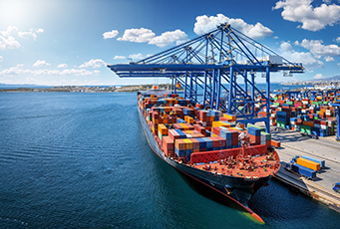In recent history, countries greatly impacted by wars usually have smaller economic footprints in global trade, and the overall global impact was not significant. This was largely true until the Russo-Ukrainian War.
The Russo-Ukrainian War has been ongoing for nearly a decade, but Russia's invasion of Ukraine in 2022 increased the scale of the war dramatically. Now that two and a half years have passed, we are getting a good understanding of the war's economic consequences.
The direct damage caused by war and conflict is clear and obvious in the nations involved. The indirect economic damage can also be immense in those countries as they often are restricted or limited in international global trade. International trade is a two-way street, so when a country is weakened by war, all other countries that trade with them are impacted.
The Rest of the World
While Ukraine and Russia are by no means the largest trading partners with the U.S., for some countries, the food and fuel from these countries keep them operating. At the start of the war in 2022, the International Fund for Agricultural Development (IFAD) found that (already limited) fuel tripled in price in Haiti.
Many countries impacted were already in tough times due to other wars, COVID-19, drought, and other problems. With receiving less wheat and other agricultural products at a higher price, countries like Yemen, Ethiopia, and Somalia are facing massive food security crises. According to the World Food Programme, 7.1 million Somalis are in crisis, with 213,000 facing catastrophic hunger and starvation. The IFAD found that 15% more Afghans were in a food crisis, with 60% of livestock in critical condition from food shortages compared to just one year earlier.
While these issues were prevalent before the Russo-Ukrainian War, the conflict exacerbated them, with measurable price increases and a drop in regional imports.
These conditions also do not appear to be improving before the war ends. While aid and new supply routes were set up for the countries relying on Ukrainian food, those areas still suffer, and the increases in costs associated with food and fuel also have not recovered. Ukraine's largest 6 crops had a drop in 20% of their net land area ready for harvest from 2022 to 2024 and continues to drop, according to the Center for Strategic International Studies.
As a result, the FAO Food Price Index increased by an average of 14% in 2022 for the top-selling food commodities, the highest on record. This is not just because of the direct loss in Ukrainian goods but also the universal increase in costs for these goods regardless of where they are produced due to a drop in supply. When these costs increase, so does inflation, and when inflation increases, so do the costs of all other goods.
Impact on the United States
The U.S. has very little direct trade with Ukraine and Russia, but that does not mean we do not feel those effects. We did not have shortages in food or fuel like some of the previously mentioned nations, but we do with semiconductors. Semiconductors have been in short supply since COVID, and while the focus of that shortage has mainly been in their production in Asia, Ukraine provides 90% of the neon, and Russia provides 35% of the palladium used in U.S. semiconductor production.
Semiconductors are important for many industries in the U.S., and the delays in their production have a broad impact. According to Mark Zandi, the Chief Economist of Moody's Analytics, inflation rose in the U.S. by 3.5% from May 2021 to May 2022, solely due to the war in Ukraine. To combat this inflation, the U.S. Federal Reserve increased interest rates, which still have not been lowered by the Fed at the time of writing.
Conclusion
War and conflict are a very costly affairs. It can be hard for us in the U.S. to fully feel the weight of these wars from this distance. The Russo-Ukrainian War shows the rest of the world how war between just two nations can have deep and widespread economic impacts.
Schedule a Consultation
We have helped our clients answer these questions and more. If you want a clear understanding of your financial future, and need help making changes to reach your goals, schedule a consultation and we can get started.
The material has been gathered from sources believed to be reliable, however Bedel Financial Consulting, Inc. cannot guarantee the accuracy or completeness of such information, and certain information presented here may have been condensed or summarized from its original source. To determine which investments or planning strategies may be appropriate for you, consult your financial advisor or other industry professional prior to investing or implementing a planning strategy. This article is not intended to provide investment, tax or legal advice, and nothing contained in these materials should be taken as such. Investment Advisory services are offered through Bedel Financial Consulting, Inc. Advisory services are only offered where Bedel Financial Consulting, Inc. and its representatives are properly licensed or exempt from licensure. No advice may be rendered unless a client agreement is in place.
Recommended Articles
Private Equity and M&A in a Low-Rate World
Deal flow is the stream of business proposals, investment...
The Bonds that Tie – An Exciting Look at Fixed Income
With today’s yields being much higher than the close to...
Is America’s Tariff War Reshaping the U.S. Economy?
The 2025 tariff regime marks the highest average...





